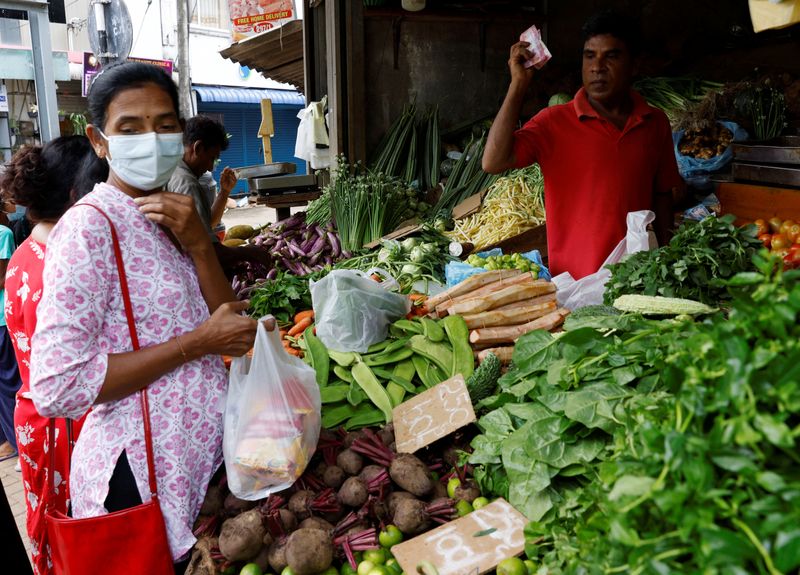Sri Lanka’s key inflation rate surges to record, keeps central bank pressured
2022.09.30 08:16
[ad_1]

© Reuters. FILE PHOTO: A vendor sells vegetables to a customer amid the rampant food inflation, amid Sri Lanka’s economic crisis, in Colombo, Sri Lanka, July 29 , 2022. REUTERS/Kim Kyung-Hoon/File Photo
By Uditha Jayasinghe
COLOMBO (Reuters) -A key measure of Sri Lanka’s consumer inflation surged to an annual record 69.8% in September, official data showed on Friday, highlighting the challenge for the central bank as the island reels under its worst financial crisis in seven decades.
The Colombo Consumer Price Index (CCPI), a leading indicator that gauges inflation in Sri Lanka’s biggest city, accelerated past the previous all-time year-on-year high of 64.3% in August.
Policymakers closely track the CCPI for their monetary assessments.
Earlier this month, Sri Lanka’s other main inflation measure, the National Consumer Price Index (NCPI), which captures broader retail price inflation, also touched a record 70.2% in August.
The South Asian island of 22 million people has been grappling with a dramatic surge in inflation for nearly a year as volatile global prices and a sharp depreciation in the value of its currency battered the economy.
Dwindling foreign exchange reserves to fund imports have intensified Sri Lanka’s crisis, causing shortages in essentials in a further blowout in the cost of living.
Food prices continue to bear the brunt of the inflationary impact, climbing to 93.7%, while prices of non-food items rose 50.2%, the statistics office said.
“September inflation is marginally higher than we expected. Clearly tariff increases for water and electricity made in August have partly filtered into this month as well,” said Dimantha Mathew, head of research at First Capital Holdings.
In an effort to tame prices and stabilise markets, the Central Bank of Sri Lanka (CBSL) has raised interest rates by 900 basis points so far this year.
The central bank is expected to stand pat on rates at its Oct. 6 policy review, after holding steady in August, as policymakers are counting on an easing in inflation over coming months amid an economic contraction.
Any easing in consumer prices will be marginal at best, analysts say, forecasting high inflation rates will remain till about the end of the first half of 2023.
Sri Lanka’s economy shrank 8.4% in the quarter through June from a year ago in one of the steepest declines seen in a three-month period, amid fertiliser and fuel shortages.
Analysts expect a further contraction in the September quarter, which would tip the country into a technical recession.
Mathew of First Capital expects inflation to reduce marginally from October, meaning prices will stay relatively high for some time.
[ad_2]
Source link








